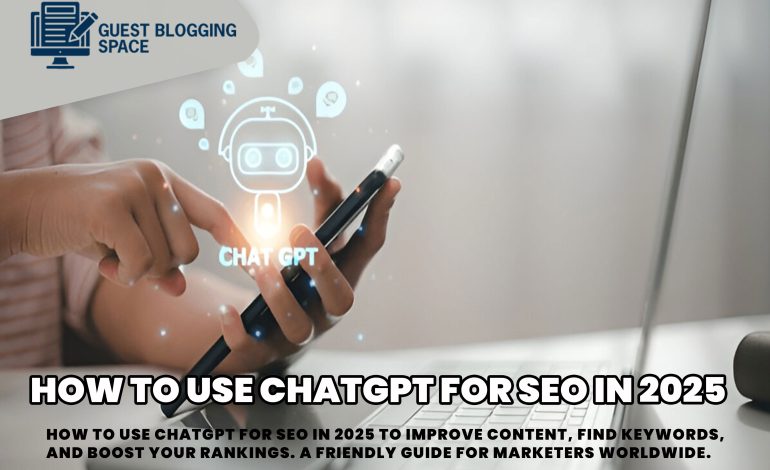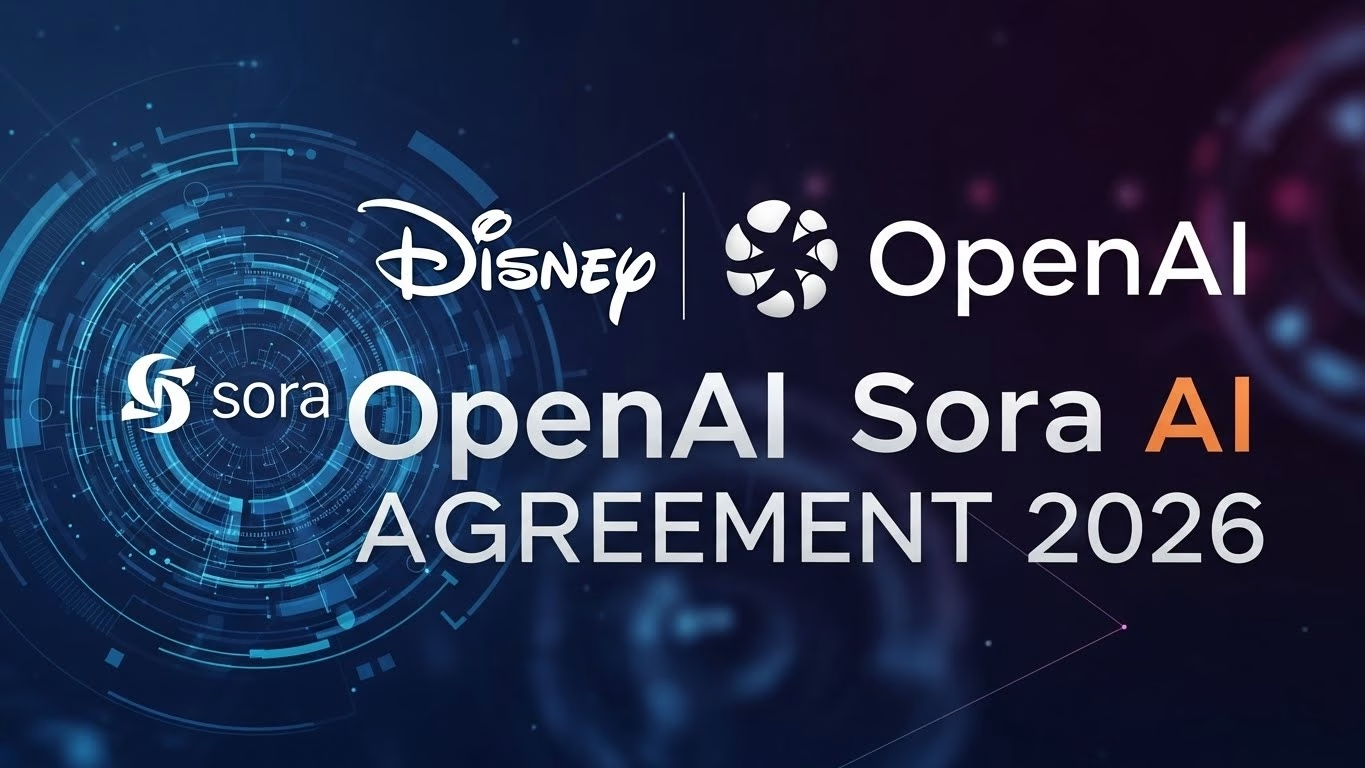How to Use ChatGPT for SEO in 2025 | Boost Rankings with AI

How to use ChatGPT for SEO in 2025 is quickly becoming a crucial question for marketers as the world of search engine optimization shifts fast—driven by smarter algorithms, evolving user behavior, and the rise of AI-powered tools. Among those tools, ChatGPT has quickly become a go-to resource for marketers looking to work smarter, not harder.
What started as a conversational AI is now being used to craft high-quality content, streamline keyword research, assist with technical SEO, and even spark new content strategies. It’s more than a writing assistant—it’s becoming an integral part of the modern SEO toolkit.
In this guide on how to use ChatGPT for SEO in 2025, we’ll show you how to harness its full potential—whether you’re looking to boost rankings, speed up workflows, or simply stay ahead of the curve.
Keyword Research & Strategy: How ChatGPT Enhances SEO in 2025
In 2025, ChatGPT has become an indispensable tool for SEO professionals aiming to refine their keyword strategies. Here’s how it contributes:
-
Generating Long-Tail Keywords and Semantic Variations
ChatGPT assists in identifying long-tail keywords and semantic variations by analyzing user queries and content context. For instance, when tasked with generating keywords related to “digital marketing automation,” ChatGPT can provide variations like “automated marketing tools” or “AI-driven marketing platforms,” which are essential for capturing specific search intents .
-
Analyzing Search Intent for Better Targeting
Understanding search intent is crucial for effective SEO. ChatGPT aids in this by categorizing keywords into informational, transactional, or navigational intents. This classification helps in tailoring content that aligns with user expectations, thereby improving engagement and conversion rates .
-
Suggesting LSI (Latent Semantic Indexing) Keywords
ChatGPT identifies LSI keywords by understanding topic relevance and related language patterns around the main keyword. For example, for the keyword “content marketing,” LSI keywords like “content strategy,” “SEO content,” and “digital storytelling” can be identified, enhancing content relevance and search engine visibility .
By integrating ChatGPT into your SEO workflow, you can enhance keyword research efficiency, ensuring your content strategy is both comprehensive and aligned with current search trends.
Content Creation & Optimization
How ChatGPT Helps:
- Write SEO-friendly blog posts, meta descriptions, and titles: ChatGPT assists in crafting engaging content that aligns with SEO best practices. It generates optimized blog posts, compelling meta descriptions, and attention-grabbing titles, enhancing visibility and click-through rates.
- Improve readability and engagement with AI-assisted editing: Utilizing AI tools, ChatGPT refines content for clarity and flow. It suggests edits to improve sentence structure, grammar, and overall readability, ensuring content resonates with readers.
- Generate structured FAQs for voice search optimization: ChatGPT creates structured FAQ sections that cater to voice search queries. By addressing common questions in a conversational tone, it enhances content’s chances of appearing in voice search results.
On-Page SEO Enhancements: How ChatGPT Helps
Internal Linking Opportunities
ChatGPT analyzes your content to identify relevant internal linking opportunities. By suggesting contextual links between related pages, it helps distribute link equity effectively. This enhances site navigation and supports search engine crawling, improving overall SEO performance.
Heading Structure Improvement (H1, H2, H3)
Proper heading structure is crucial for both readability and SEO. ChatGPT assists in organizing content by generating optimized H1, H2, and H3 tags. These headings incorporate relevant keywords, improving content hierarchy and making it easier for search engines to understand your content.
Alt Text for Images with Keyword Optimization
Images are an integral part of web content, but they need to be optimized for SEO to ensure that they contribute positively to your site’s performance. ChatGPT can generate SEO-friendly alt text for images, ensuring that they are descriptive and keyword-rich, which helps with image search rankings.
By optimizing internal linking, heading structures, and image alt text, ChatGPT contributes to improved site navigation, content clarity, and search engine visibility. These enhancements lead to a better user experience and higher search engine rankings
Technical SEO & Site Audits: How ChatGPT Helps in 2025
ChatGPT serves as an essential resource for improving technical SEO and performing comprehensive site audits. By leveraging its capabilities, you can identify issues, optimize your site, and improve search engine visibility.
Identifying Broken Links, Duplicate Content, and Crawl Errors
ChatGPT assists in detecting broken links, duplicate content, and crawl errors by analyzing your website’s structure and content. It can suggest areas for improvement, ensuring a smoother user experience and better search engine indexing.
Generating Robots.txt and .htaccess Rules
Creating and managing robots.txt and .htaccess files is crucial for controlling search engine access to your site. ChatGPT can generate these files, helping you manage crawl behavior and enhance site security.
Suggesting Schema Markup for Better Rich Snippets
Using schema markup helps search engines interpret your content more effectively, resulting in improved search features like rich snippets. ChatGPT can suggest appropriate schema types and generate the necessary code for your site.
By integrating ChatGPT into your technical SEO strategy, you can streamline site audits, identify critical issues, and implement effective solutions, ultimately improving your site’s performance and visibility in search engine results.
ChatGPT in 2025 is a powerful resource for SEO backlink strategies.
In 2025, ChatGPT has become a vital tool for enhancing SEO strategies, particularly in backlink outreach and link building. Its capabilities streamline the process, making it more efficient and effective.
Personalized Outreach Emails for Guest Posting
ChatGPT assists in crafting tailored outreach emails for guest posting opportunities. By analyzing the target website’s content and audience, it generates personalized messages that increase the likelihood of a positive response. This personalization fosters stronger relationships and enhances the chances of securing valuable backlinks.
Identifying Broken Link-Building Opportunities
ChatGPT helps locate outdated or inactive links on high-traffic sites. By replacing these dead links with relevant content from your site, ChatGPT helps in acquiring high-quality backlinks. This strategy not only improves your site’s SEO but also provides value to the website owners by fixing broken links.
Generating Anchor Text Variations for Natural Linking
ChatGPT generates diverse anchor text variations, promoting natural link profiles. This diversity prevents over-optimization and aligns with search engine algorithms that favor organic linking patterns. By using varied anchor texts, your backlink strategy appears more authentic and is less likely to be penalized by search engines.
Incorporating ChatGPT into your backlink outreach and link-building efforts in 2025 enhances efficiency and effectiveness. Its ability to personalize outreach, identify broken link opportunities, and generate diverse anchor texts contributes significantly to a robust SEO strategy.
AI-Powered Competitor Analysis: Leveraging ChatGPT for SEO in 2025
In 2025, ChatGPT has evolved into a sophisticated tool for SEO professionals, enabling in-depth competitor analysis to enhance search engine rankings. By integrating AI capabilities, ChatGPT assists in identifying content gaps, analyzing backlink profiles, and uncovering top-performing keywords, providing a strategic advantage in the competitive digital landscape.
Analyzing Competitor Backlinks and Content Gaps
ChatGPT facilitates the examination of competitor backlink profiles, identifying high-quality links that contribute to their domain authority. By analyzing these backlinks, SEO experts can uncover opportunities for acquiring similar links, thereby enhancing their own site’s credibility and search engine ranking. Additionally, ChatGPT aids in detecting content gaps by comparing existing content with that of competitors, highlighting areas where additional or improved content can attract more organic traffic.
Extracting Top-Performing Keywords from Competitors
Utilizing ChatGPT, SEO professionals can analyze competitor websites to identify top-performing keywords. By examining elements such as meta descriptions, headings, and content, ChatGPT can extract keywords that drive significant traffic to competitors’ sites. This information is invaluable for refining keyword strategies, ensuring that content aligns with search terms that potential visitors are actively seeking.
Suggesting Content Ideas to Outperform Rivals
ChatGPT excels in generating innovative content ideas that can surpass competitors. By analyzing successful content strategies within a specific niche, ChatGPT provides suggestions for unique topics, formats, and angles that can attract and engage a target audience more effectively. This proactive approach to content creation ensures that SEO strategies remain dynamic and competitive, positioning websites to outperform rivals in search engine results.
Voice Search & AI Chatbot SEO: How ChatGPT Helps
As voice search and AI chatbots become integral to user experience, optimizing for these technologies is crucial.
Optimizing for Voice Search Queries
Voice searches are conversational and often longer than typed queries. ChatGPT aids in crafting content that mirrors natural speech patterns, enhancing visibility in voice search results. By focusing on long-tail keywords and question-based queries, ChatGPT helps align content with how users speak, improving search engine rankings.
Improving Google’s People Also Ask (PAA) Rankings
The People Also Ask (PAA) feature provides users with related questions and answers. ChatGPT assists in identifying common questions and generating concise, informative answers. By structuring content to address these questions directly, ChatGPT increases the likelihood of appearing in PAA sections, thereby enhancing content visibility.
Generating Conversational AI Chatbot Scripts for Websites
AI chatbots are essential for user engagement on websites. ChatGPT helps in creating scripts that facilitate natural and effective conversations. By simulating human-like interactions, ChatGPT ensures that chatbots can handle a wide range of user inquiries, improving user experience and satisfaction.
In conclusion, ChatGPT plays a pivotal role in optimizing content for voice search, enhancing PAA rankings, and generating effective AI chatbot scripts. By leveraging these capabilities, businesses can improve their SEO strategies and provide better user experiences.
SEO in 2025 Made Easy: Automating Reports with ChatGPT
In 2025, ChatGPT revolutionizes SEO by automating tasks like SEO audits, rank tracking, and performance analysis. This integration saves time, enhances accuracy, and provides actionable insights for digital marketers.
Automating SEO Audit Reports
ChatGPT streamlines SEO audits by analyzing website data and generating comprehensive reports. Users can upload CSV or Excel files containing metrics such as bounce rates, session durations, and traffic sources. ChatGPT processes this data to identify issues like broken links, slow-loading pages, and missing meta tags. It then provides recommendations for optimization, including suggestions for improving page speed, enhancing user experience, and optimizing on-page elements. This automation reduces manual effort and ensures consistent, thorough audits.
Creating Rank-Tracking Summaries
For effective SEO management, monitoring keyword rankings is crucial. ChatGPT assists by generating rank-tracking summaries from keyword performance data. By analyzing metrics such as search volume, current ranking, and competition score, ChatGPT can create templates or placeholder reports to manually track progress. These summaries help in identifying trends, assessing the effectiveness of SEO strategies, and making informed decisions to improve rankings.
Generating Performance Insights from Google Analytics
Integrating ChatGPT with Google Analytics allows for in-depth performance analysis. By exporting data related to user engagement, conversion rates, and traffic sources, ChatGPT can provide insights into areas like peak traffic times, device usage patterns, and top-performing pages. This information aids in optimizing content strategies, improving user experience, and enhancing overall site performance. Additionally, ChatGPT can suggest A/B testing strategies and recommend optimizations for landing pages to boost conversion rates.
ChatGPT’s capabilities in automating SEO audits, creating rank-tracking summaries, and generating performance insights from Google Analytics significantly enhance SEO efforts. By leveraging these features, digital marketers can improve efficiency, make data-driven decisions, and achieve better search engine rankings. As AI continues to evolve, tools like ChatGPT will play an increasingly vital role in shaping the future of SEO.
AI-Generated Video SEO: Enhancing Content Creation
AI tools like YouTube’s Veo model assist creators in generating video ideas, titles, and even full scripts. These tools streamline content creation, making it more efficient and accessible. Additionally, platforms such as TikTok are introducing generative-AI tools to assist creators in generating ad scripts, translating videos, and creating AI-generated avatars.
AI-Powered Personalization: Tailoring User Experiences
AI enables the creation of dynamic meta tags and personalized content that adapts to individual user preferences. By analyzing user behavior and preferences, AI can tailor content to meet specific needs, enhancing user engagement and satisfaction.
Zero-Click Optimization: Capturing Immediate Attention
Zero-click searches, where users find answers directly on the search results page, are becoming more prevalent. Optimizing for featured snippets and other direct-answer formats ensures visibility in these search results, even without a click-through.
Embracing AI in SEO strategies for 2025 is crucial for maintaining a competitive edge. By focusing on AI-generated video SEO, AI-powered personalization, and zero-click optimization, businesses can enhance their online presence and user engagement.









